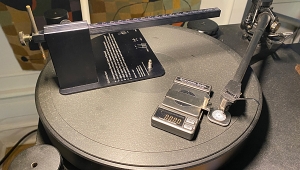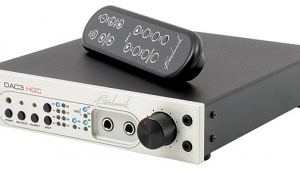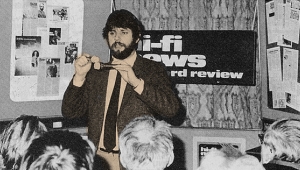| Columns Retired Columns & Blogs |
A Babel, a Babble . . . Page 4
Olsher: Then let's change the measurements that are done. Your opinion shouldn't change.
Galo: I agree with Lew that what the product sounds like is most important. How I see the measurements is helping both the reviewer and the reader understand why the product sounds the way it does.
Holt: But I don't think most of our readers give a damn as to "why." Other manufacturers do.
Lipnick: You have a responsibility to explain your findings. The technical stuff obviously has to back up the subjective description.
Holt: I think the main function of measurements in the magazine has been to lend some credence to the reviewer's observations.
Atkinson: Particularly when it's overall a negative review, to help hold any response from the manufacturer down...
Larry Greenhill: I'd just like to talk about where I think some of these points are headed overall. One of the strongest points in terms of Stereophile over the years has been that it's one of the few consumer-oriented magazines that deals with the consumer as a purchaser of very expensive investment. If you look all over the field of things you can purchase, such as photographic equipment, computer equipment, or high-end stereo equipment, a lot of what the consumer is left with is magazines that take a point of view that they want to explain the product to the consumer and so be another voice for the manufacturer. From the beginning, Stereophile has really not taken that direction.
And I would say it's had kind of another principle behind it, which has been a somewhat laid-back, noninterfering editorial policy. That is, the editor is supportive of the writers. It's encouraged individuality. I've worked for a number of magazines where you were given a cookie-cutter kind of a template—your review has to go A-B-C-D—and if it doesn't quite fit the style or the approach, then you run into a lot of friction with the editor. This is very important because what's happening now in this discussion is a question about whether more uniformity should be slowly introduced into the reviews. There are some really good reasons for that, in terms of trying to make something you read from one reviewer make sense in terms of another reviewer. I'd be very interested to hear how much this discussion is going in the direction of kind of formulating editorial policy about how the reviewers should think about their craft.
Lipnick: Just as one writer, I'd like to say it's so nice to be able to write a review, submit it, and know that what comes out the other end is what I wrote. And if I was wrong technically, thank goodness they have people here who will correct me. But I don't know another publication like that where I could send something in that's so subjective and it would just be left alone.
Holt: National Review.
Lipnick: I think that's very important. Because that other magazine, I know that if you don't toe the party line, either they won't print what you wrote, or you'll be ridiculed by the editor, in your own review...
Galo: ...in a footnote...
Lipnick: ...which I find totally unacceptable.
Holt: I agree.
Atkinson: A criticism of Stereophile that was made in The Abso!ute Sound a couple of issues back, and was then also made in a letter published in our September issue, is that whereas The Abso!ute Sound speaks with a single voice—Harry Pearson's—we produce a Babel of disparate opinions. We don't speak with one voice; we don't have one mind. I actually think this is a specious criticism because I think the one thing that has drawn us together is that we all basically come from the same place philosophically. Nevertheless, how do we avoid this?
Lehnert: Why should we avoid it? It's a magazine of opinion.
Atkinson: How can we weld disparate opinions into a strong united front?
Lehnert: Why should we try? [hubbub]
Mitchell: That's part of the question.
Atkinson: You see, as an editor, my policy is simple. All I want from my writers is: a) Is this a well-formed and informed opinion? b) Has it been expressed clearly? If both are the case, it appears in print. I don't want to impose my viewpoint upon anyone else because, as you know, my particular cocktail of tastes and opinions is going to be different to anyone else's. I certainly do not want to restrict Stereophile's viewpoint just to what I think. But now I see this policy actually being turned into a criticism against the magazine.
Holt: Well the thing is, when I was talking about leadership a while ago, about the magazine maybe leading the issues a little bit more, I wasn't talking about trying to force the writers into any kind of editorial mold. What I was talking about was perhaps keeping more in mind the things which are generally agreed to by everybody who is serious about this business. And pushing this stuff in the magazine all the time.
Look, for instance, at the number of times that practically every reviewer who has reviewed a turntable puts it down because it hasn't done the suspension thing properly. Yet we continue to get turntables for review from people who obviously none of this has penetrated. I mean, they should know they're going to get a bad review from reading all of the other reviews which have picked things apart for that reason, yet they'll then send us product for review which has the same problem.
Norton: They don't read our reviews then.
Lehnert: Also they believe that there is no such thing as bad publicity.
Holt: Well, maybe. But this is one of the reasons why I feel we're not making our point in some areas here. I mean, look at that speaker system that Dick reviewed a while ago. Kentucky Sound? Was that the name?
Olsher: Tennessee Sound! [laughter]
Holt: Well, I'm close! Anyway, the thing was obviously flawed before we even listened to the sound. We pointed out to the manufacturer obvious signs of very bad design. He still insisted that we go ahead and review it.
Olsher: Did he ever!
Lipnick: May I make a point about the uniformity in reviews? Talk about the criticism you're getting about not having a uniform voice, the interesting thing I see about Stereophile (which is also one reason I like writing for this magazine very much) is that we have amassed a fairly large number of people who are very good at what they do in different ways. In other words, everyone's got a little different expertise: you have people who are more technically oriented; you have me who's just basically "I'm not an engineer at all but I'm a musician"; there are people who do this, do that; and that way you get diverse points of view which are all valid. That's very important. Because if you start imposing this sort of generic approach on everything, you're going to get one person's opinion basically coming out of it. One editorial opinion. Which is not right. If you have people who are competent—and I believe that this magazine has the most competent writers I've yet seen—then it works. "If it ain't broke, don't fix it."
Remember, we're talking about subjective things, we're talking about the emotional impact of buying equipment. People buy the stuff, not only just to listen to music, they buy it because it's emotionally impactful on them, it's an ego thing for them to buy stuff. With manufacturers, it's an ego thing for them to build it. When I write about a piece, I talk about the emotional impact of being a musician. The hell with the way it's made, as far as I'm concerned. If I can sit there and I'm really drawn into a performance, it's great.
Holt: You're talking about the emotional impact of the sound.
- Log in or register to post comments




































